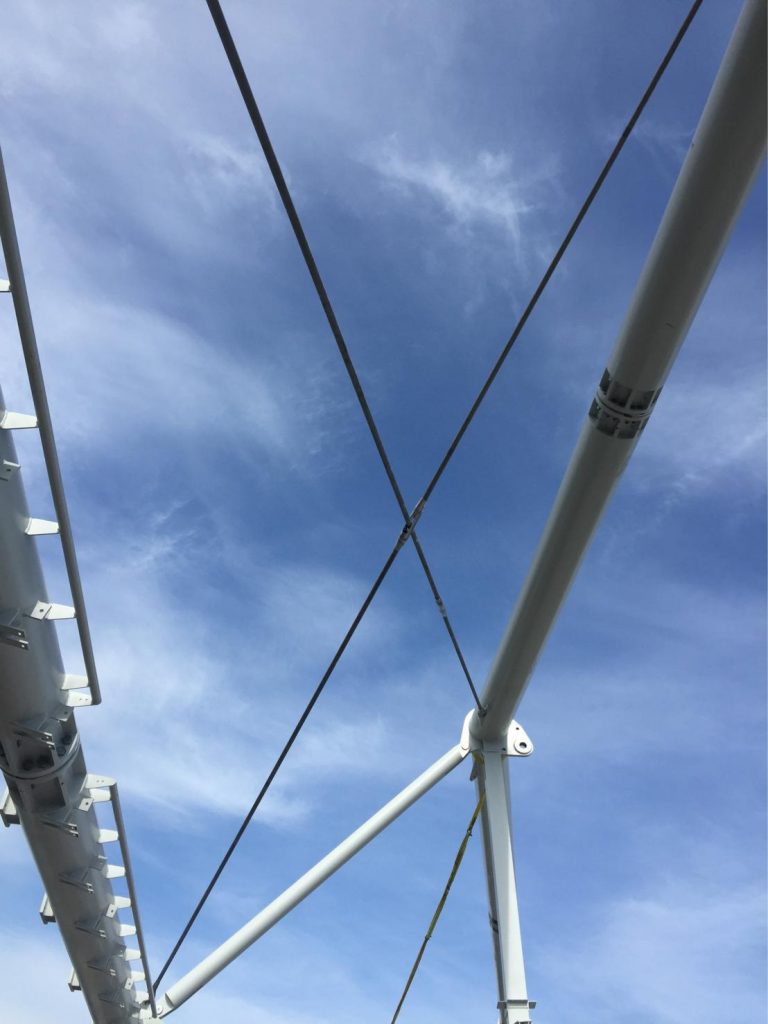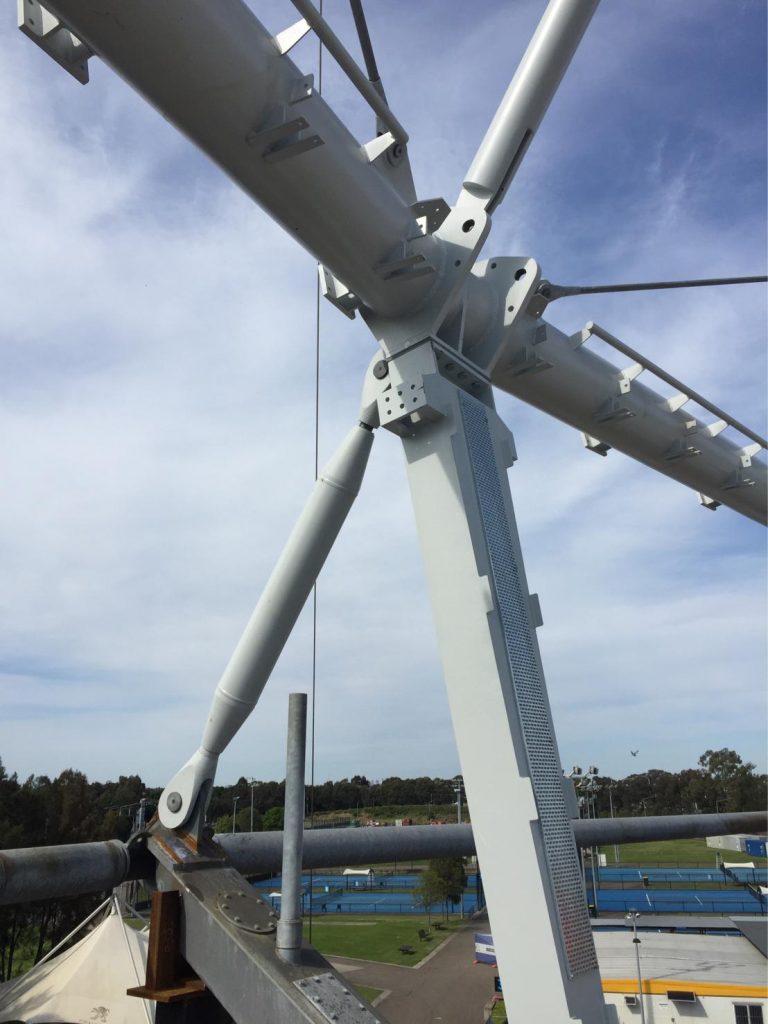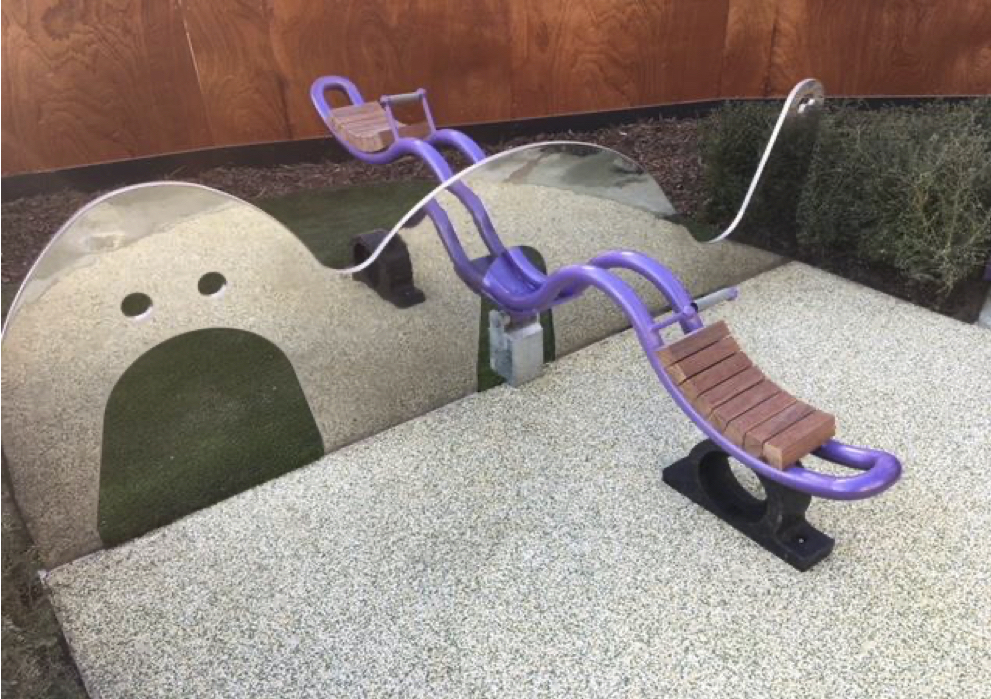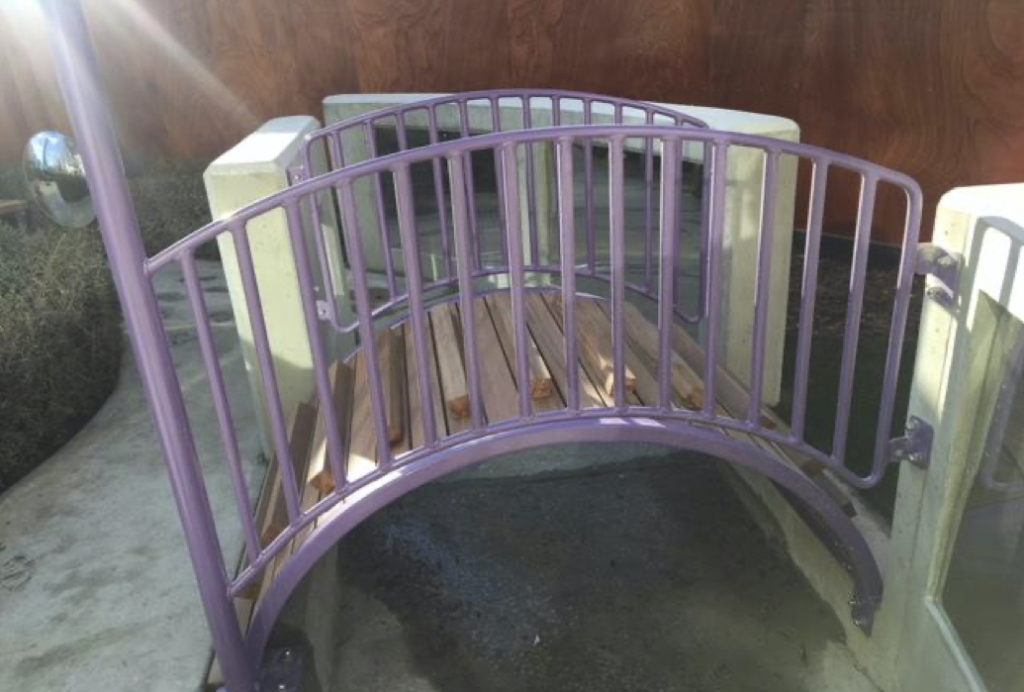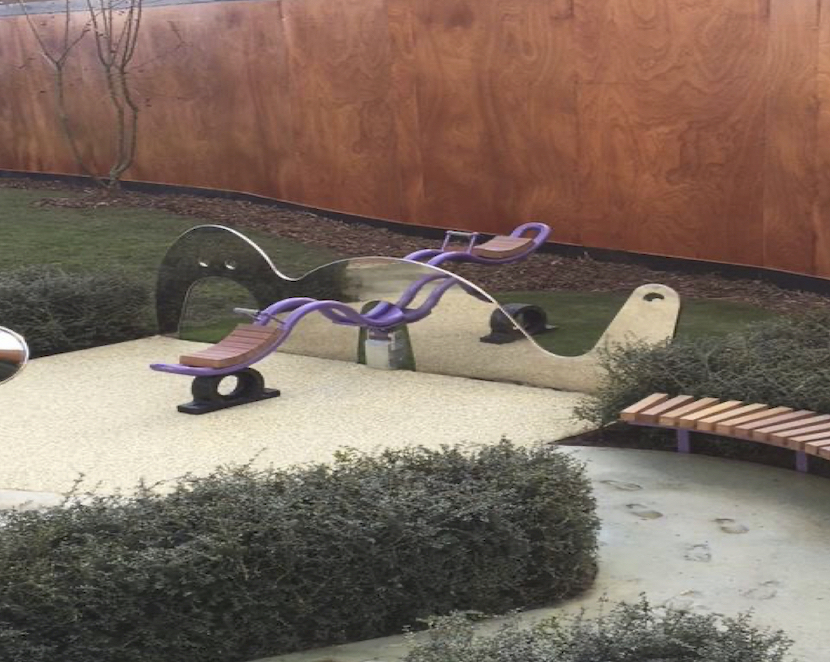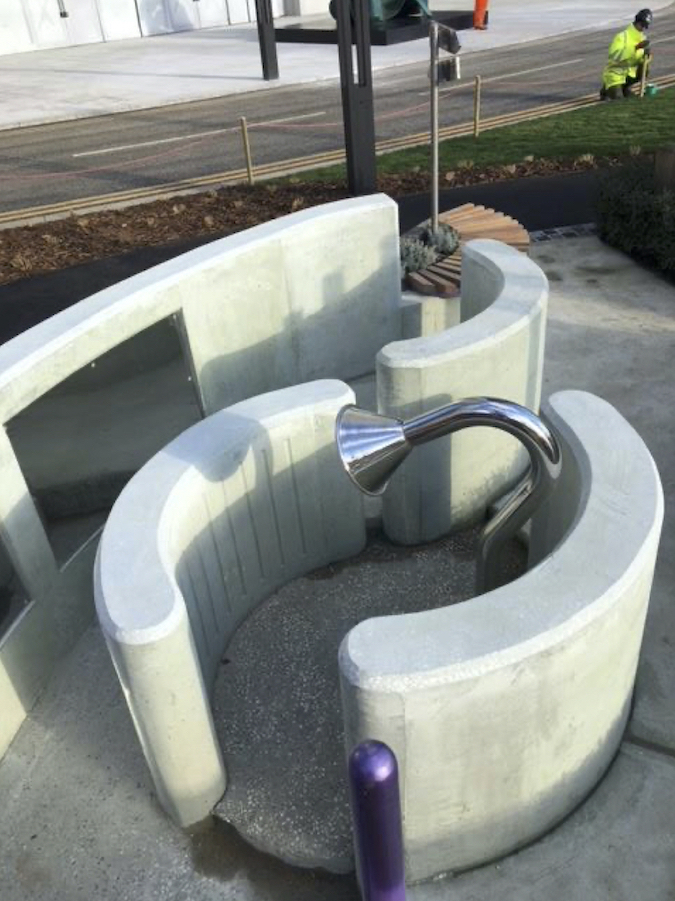Dennis the dragonfly…
And hot dip galvanized garden sculptures
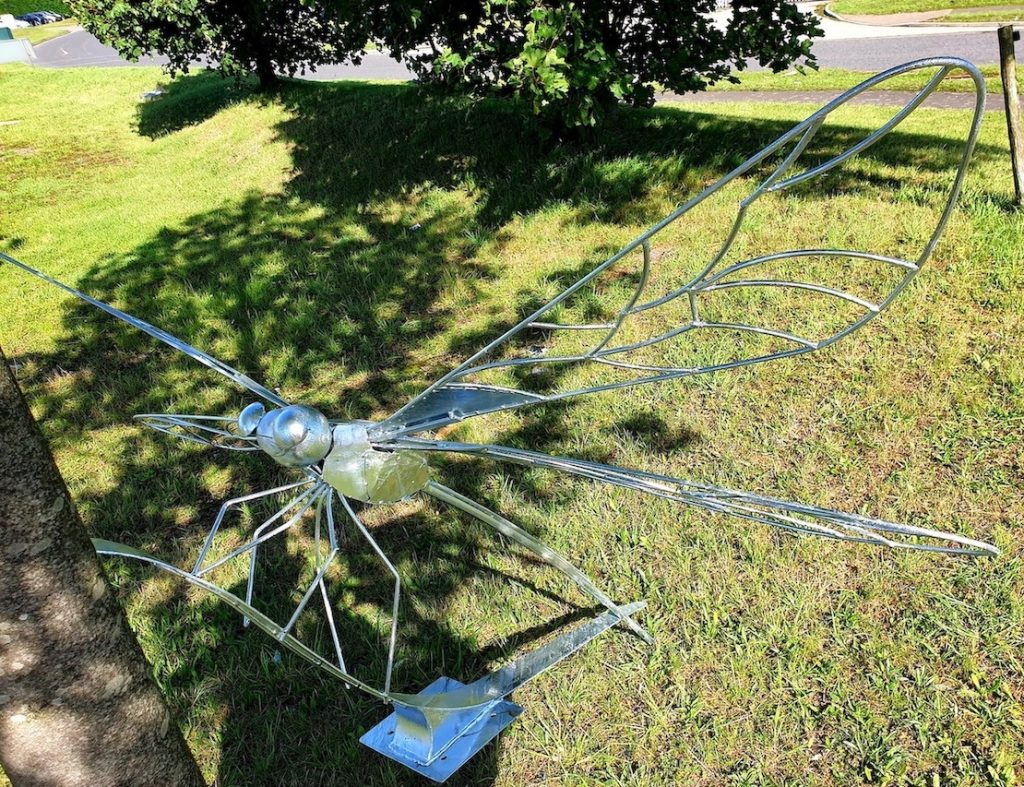
Two years ago, a client of our Corby (Premier Galvanizing) plant – Kurt Lightfoot – received an unusual birthday present from his wife: an artist’s metalwork course. Kurt completed the course and became hooked, and two years on now runs his own steel metalcraft business called Orna-Metal UK.
Orna-Metal UK – based in Peterborough – specialises in quality handmade garden features, household decorative ornaments and bespoke sculptures for independent retailers and private customers. Every item is unique using traditional methods and skills.
Drawing on inspiration from the ‘Arts and Craft’ movement of the late 19th century, which rebelled against poor quality mass production, Kurt creates works of arts which reflect the organic beauty of nature.
One such work of art is Dennis the Dragonfly!
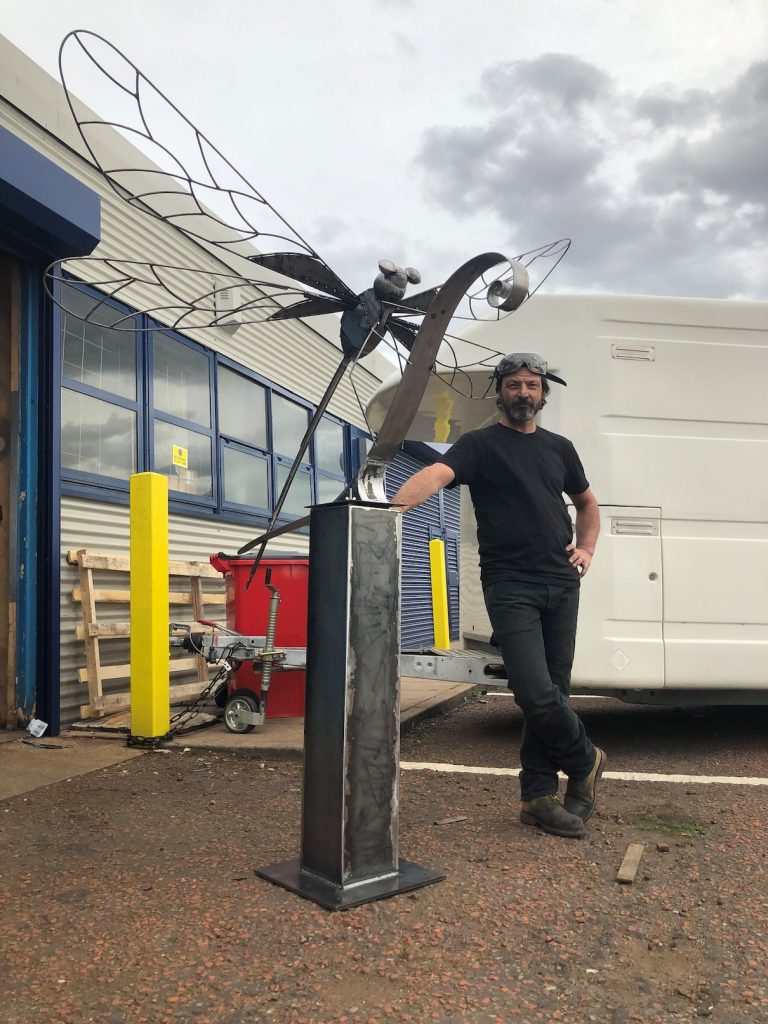
To grow his business, Kurt spent time exhibiting at craft shows and wanted a statement piece to attract attention. He decided to sculpt a magnificent dragonfly, and Dennis was born!
After taking Dennis to two shows, a customer approached Kurt with an offer to buy. However, the customer wasn’t keen on the weathered look, and wanted the dragonfly to be shiny and silver so that it would stand out on the island on a lake, where it’s now installed.
Hot dip galvanizing was the answer and Kurt booked our Corby plant to manage the finish.
Premier Galvanizing Corby was the perfect option as the galvanizing baths could accommodate the large size of Dennis.
The team at Corby rose to the challenge and treated the dragonfly with a protective galvanized finish that will last for many years to come.
Kurt was very pleased with the finish and has since sent some additional sculptures to Corby. Below are some cala lillies, which were hot dip galvanized in late Summer/early Autumn.
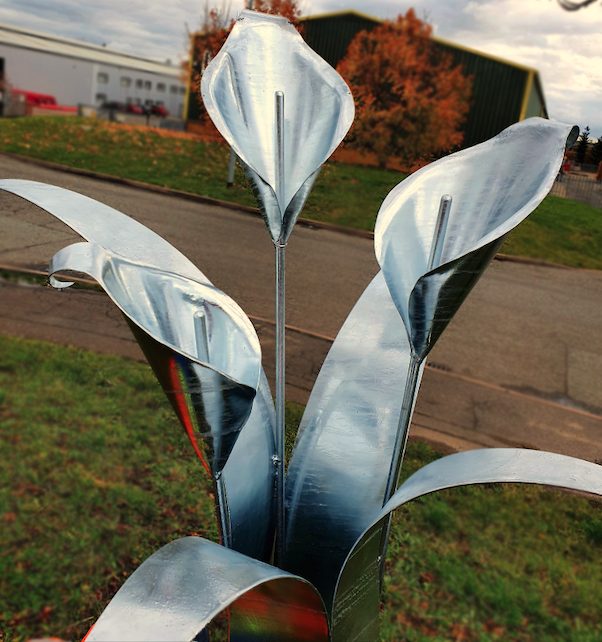
It’s a pleasure to work on such impressive works of art and we look forward to a growing relationship with Kurt and Orna-Metal UK.
Racks for Automatic Carton Freezers treated by Joseph Ash Galvanizing
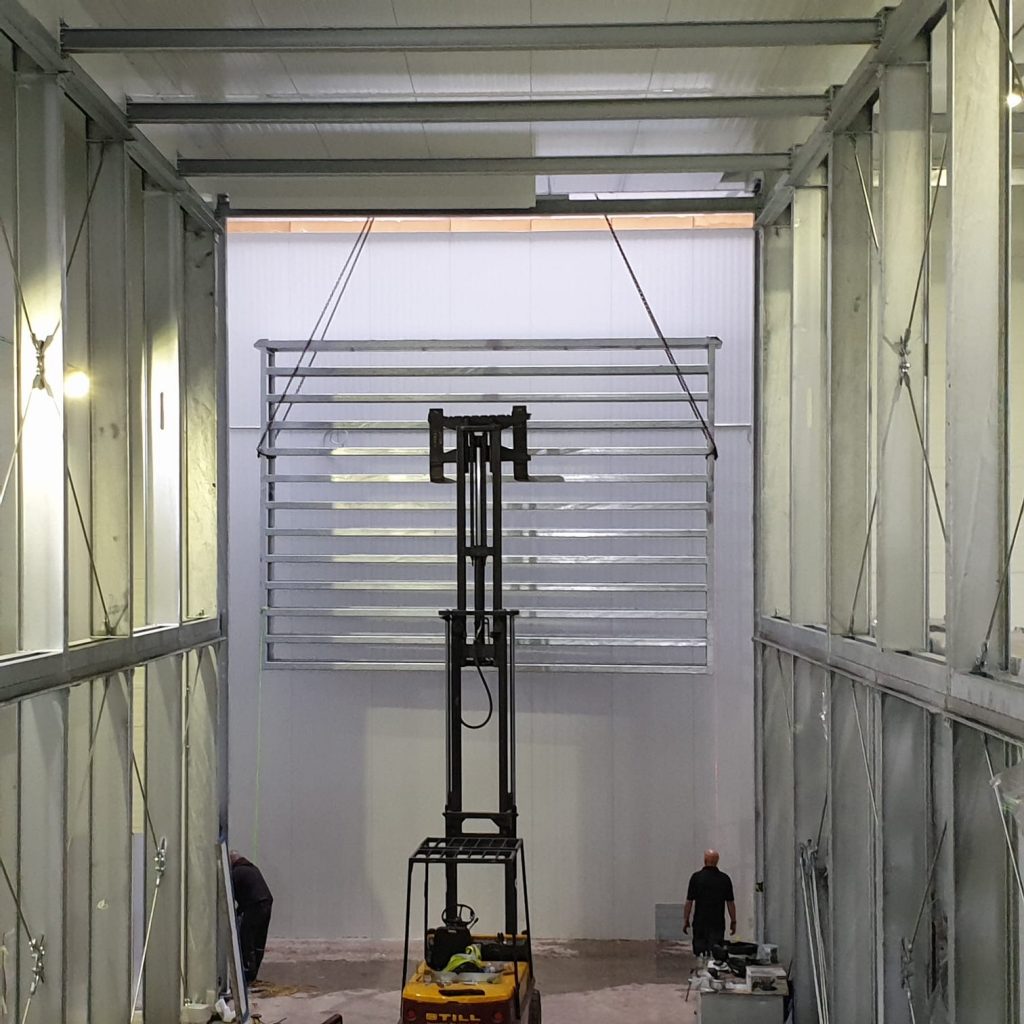
In 2019, Westfort Meat Products started work building a brand new state-of-the-art modern meat processing facility, with an integrated cold-storage and freezing warehouse. They turned to NH3 Ltd to produce the freezers. NH3 Ltd commissioned Midlands Structures to fabricate the steel, who, in turn, booked Joseph Ash Walsall to treat the steel.
Westfort Meat Products is a Dutch family business, based in Utrecht, The Netherlands. With a long history in the pork industry, they are now known as one of the world’s most cutting-edge meat processors.
As part of a 2019 construction project, they embarked on a mission to build a brand-new cutting plant and deboning facility, including a built-in cold-storage and freezing warehouse. It was part of an initiative to bring all new facilities under one roof, to improve centralisation and logistics.
The construction project involved the need for two new Automatic Carton Freezers (ACF), and Westfort commissioned NH3 Ltd to make them.
Based in Suffolk, England, NH3 are industrial freezing and chilling specialists, who design, install, commission and maintain bespoke industrial refrigeration plants worldwide.
NH3 set to work manufacturing the two ACF’s for Westfort, which they believe are the biggest freezers in Europe, if not the world.
As part of the project they commissioned Midlands Structures to fabricate the steel racks, which weighed in at about 700 tonnes.
For such a large project, durability and longevity is key. Therefore, Joseph Ash Walsall was booked by the steel fabrication company to treat the steel with a hot dip galvanized coating.
Hot dip galvanizing is important because it provides a long-life, low-maintenance corrosion protection which safeguards steel from atmospheric attack.
In total, Joseph Ash treated approximately 1000 racks for the freezers, as well as other parts of the machinery.
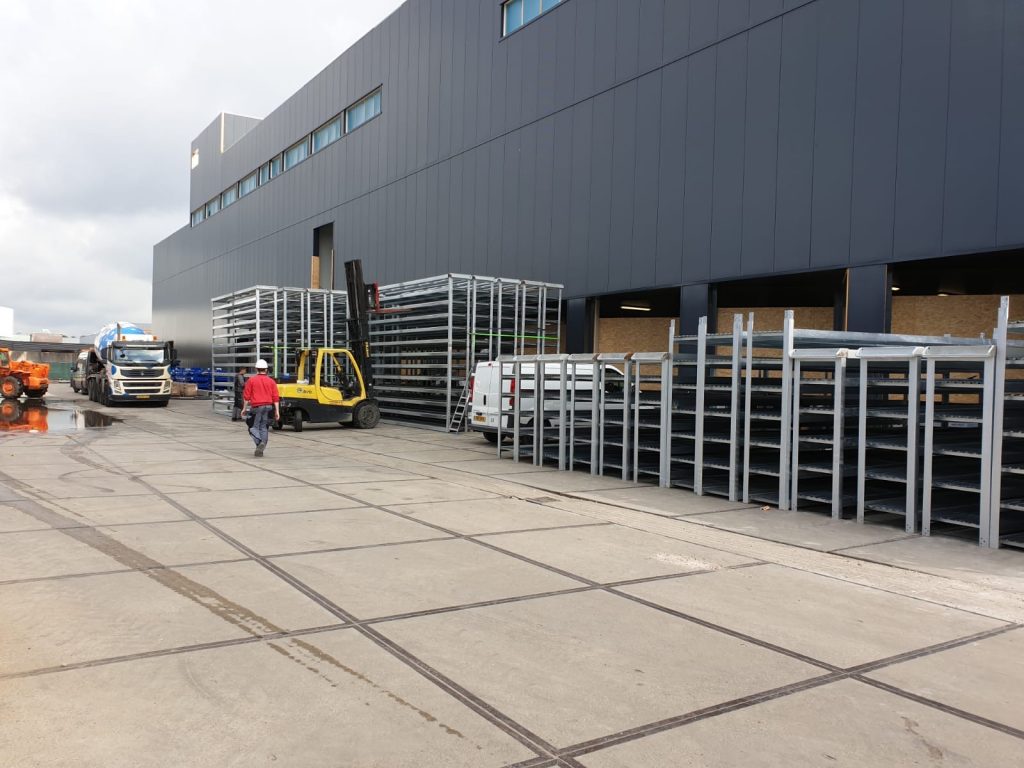
The construction project at Westfort Meat Products is due for completion this year. To see the scale of the Automatic Carton Freezers, watch this NH3 video.
A stunning sculpture of a horse and hare, hot dip galvanized at Joseph Ash Walsall.
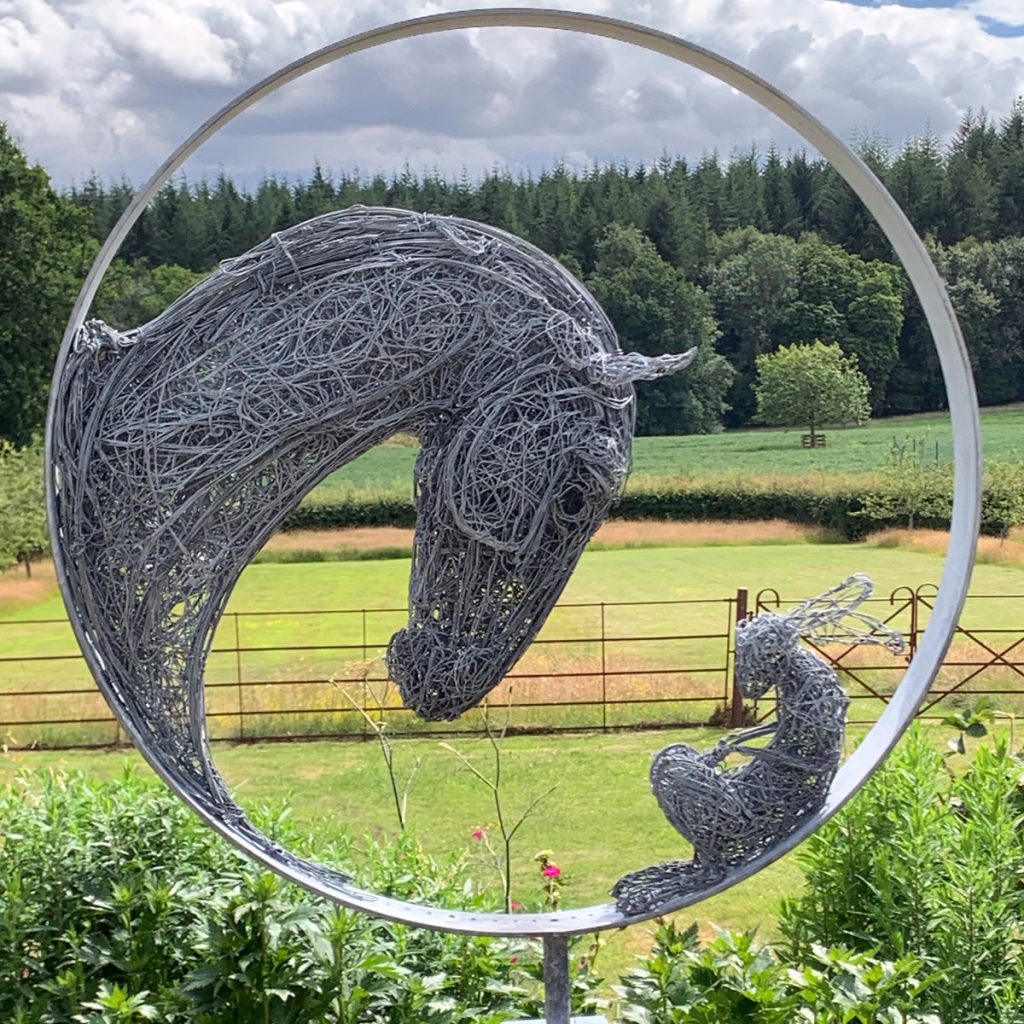
A few years ago, sculptural artist Rupert Till sketched out a drawing for a sculpture of a horse and a hare. He added it to his to-do list as something to create one day. Lockdown provided the perfect opportunity, and ‘Never Alone’ was created. Joseph Ash Walsall was happy to galvanize it for him.
Rupert Till is one of the leading contemporary sculptors in the UK. He uses bronze, steel and copper to create stunning works of art depicting nature. Not only have the sculptures been featured in a number of galleries across the UK, but Rupert has also exhibited at the RHS Chelsea Flower Show every year for the past 25+ years.
The inspiration behind ‘Never Alone’
As a country boy at heart, Rupert has always had a love for animals, with his own horses acting as life models for many of his sculptures. A few years ago, he had an accident at work when installing a sculpture, and whilst he recovered, he continuously drew small hares. These drawings inspired him to combine both animals – horse and hare – into one piece of art. The result was a charming sculpture called ‘Never Alone’.
Protection for metal sculptures
Because Rupert’s sculptures are made from intertwined metal, they are often hot dip galvanized as a form of protection.
Hot dip galvanizing is important because it provides a long-life, low-maintenance corrosion protection which safeguards steel from atmospheric attack.
A valued customer
Rupert has been sending his works to Joseph Ash Walsall for years. Sometimes sending in 5-10 sculptures at a time, and averaging about 40+ large sculptures each year (alongside smaller ones too). As well as galvanizing ‘Never Alone’ earlier this year, in May, the team at Walsall also hot dip galvanized nine sheep, some hens, three horse heads and a pair of boxing hares for Rupert. The menagerie of steel animals made an amusing sight at the plant!
Rupert said: “I think the team at Joseph Ash Walsall look forward to a challenge when receiving my sculptures. And they respect my knowledge of galvanizing, as it’s a service that I’ve needed for over 30 years. I would like to thank everyone at Walsall for treating my art over the last 10 years!”
Find out more about Rupert
Rupert lives in the Cotswolds with his wife and three children, in a stone house with converted stables where he has set up his studio. You can read more about him (and see more of his work) on his website. You can also read more in an interesting article written in Homes & Gardens by Emma Page in 2019. Rupert exhibited ‘Never Alone’ at the Josie Eastwood Gallery in Hampshire and it was sold at preview to a well-known garden designer. In 2021 Rupert plans to recreate it and showcase it at the 2021 Chelsea Flower Show. He then wants to auction it to raise funds for a mental health charity.

We’re pleased to announce that our client – J.B. Corrie – has successfully trademarked the name ‘Corrie Padel’. This is excellent news for them as they have been a UK pioneer in developing padel tennis courts for the UK market since 2019. We’re also excited because we’re looking forward to galvanizing the steel for the Corrie Padel (TM) system going forwards.
What is padel tennis?
Padel tennis is typically played in doubles on an enclosed court, with a playing area roughly a third of the size of a tennis court. The sport shares and combines many characteristics with tennis and other racquet sports. For example, the ball used in padel is very similar to that in tennis – but the court’s walls can be played off in a similar way to squash.
What is the Corrie Padel?
As padel is mainly played outdoors, the UK climate – with its regular high winds and driving rain – posed a number of challenges for padel court design. However, as fencing specialists, J.B. Corrie came up with a new product for the UK market to counter the challenges. For example, to ensure longevity and to weather-proof the courts, all materials used are hot dip galvanized to BSEN ISO 1461:2009 standards. They are also powder coated to BSEN 13438, in order to offer customers a choice of colours.
Other elements of the unique design include the use of 12 mm toughened (BSEN 12150-1) and heat soaked (BSEN 14719-1) glass, complete with polished edges and countersunk fixings.
LED lighting can be added to allow year-round use, with static integrated posts and also automated retractable lighting.
The courts can also be personalised – for example by having club logos or designs printed onto the glass. This offers a more robust option to the conventional vinyl stickers, which have a habit of wearing over time.
Growing in popularity
At present, there are only 74 padel courts in Britain, but the LTA is on a mission to help this number grow – particularly as it’s a great game for families and tennis newbies. The LTA is fuelling growth by providing sports club with £250,000 grants to build new padel courts, which is payable interest free over a 10-year term.
One such club to take up the offer is Chichester Racquets and Fitness Club, and J.B. Corrie is currently supplying the Corrie Padel (TM) court for installation on their grounds. The steel was recently hot dip galvanised and powder coated at Joseph Ash Medway.
Watch this space
The padel courts are scheduled to be finished at Chichester Racquets and Fitness Club by mid-September, and now that gyms have reopened, it will be great to see the courts in use. It will also be a great way for people to get engaged in sports again and become active after months of lockdown.
Install your own courts
If you’re interested in installing padel courts at your sports facility, please get in touch with J.B. Corrie. The Corrie Padel (TM) will be your perfect solution.
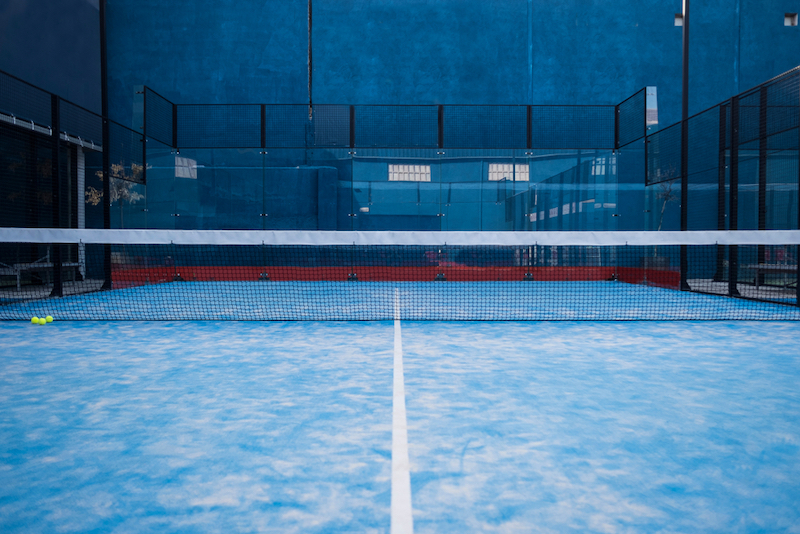
Padel Tennis was first invented in 1915 by a Minister in New York who wanted to provide recreational activities for children in local neighbourhoods. Fast forward more than a century and it has become widespread in the US, it’s growing rapidly in Europe, and it’s starting to make its mark on the UK. JB Corrie, Joseph Ash Galvanizing, the Lawn Tennis Association (LTA) and Chichester Racquets and Fitness Club are helping with the movement to make the sport more popular.
Padel Tennis is a game that resembles lawn tennis and squash. It is played on a smaller court to lawn tennis, with lower nets, and walls that the balls can be bounced off, in a similar way to squash. The racquets are solid without strings, and the tennis balls are depressurised.
It is a great sport for families and people wanting to newly engage in tennis as the ball can be kept in play for longer.
At present, there are only 72 Padel Courts in Britain, but the LTA is on a mission to help this number grow. They are doing this by providing sports club with £50,000 grants to build new Padel Courts, which is payable over a 10-year term.
Padel Court manufacturing
Chichester Racquets and Fitness Club in West Sussex have taken up the challenge and they will be installing their first Padel Courts in the next few months. JB Corrie, a fencing manufacturer based in Hampshire, is helping by manufacturing the courts. And our Medway plant is helping by hot dip galvanizing and powder coating the steel.
JB Corrie has been in business for over 100 years providing specialist fencing installations and supplies. They have a wealth of experience in designing and fabricating fencing for all types of venue, including sports facilities. They also have a strong interest in the Padel Tennis movement, and a long relationship with the LTA, which makes them the perfect fit for this job.
JB Corrie provides high levels of quality and meet all the necessary fencing industry standards such as ISO 9001:2008 and UVDB Verification. This strong adherence to industry standards is an important consideration for this project as the LTA insist on a particular thickness of steel for the fencing and for LTA specified projects. Corrie Padel is hot dip galvanized to BSEN ISO 1461:2009 and power coated in a range of over 300 standard RAL colours to BSEN 13438.
JB Corrie also supply 12mm toughened glass to BSEN 12150 with an option for heat soaking, as well as printing options for club logos.
JB Corrie are currently manufacturing the fences and will be delivering them to Joseph Ash Galvanizing in the week beginning 3 August. (Watch this video to see a plan of the fences.) The team at Joseph Ash Medway will then spend a few weeks hot dip galvanizing and powder coating the steel ready for it to be delivered to Chichester Racquets and Fitness Club and installed on their grounds.
Hot dip galvanizing is important because it provides a long-life, low-maintenance corrosion protection which safeguards steel from atmospheric attack, especially in coastal counties such West Sussex.
The final powder coating finish further protects the steel with a low maintenance, long lasting, colourful covering and adds an attractive final finish.
The ball is in!

Once full COVID restrictions are lifted, Chichester Racquets and Fitness Club will be hosting an open day to launch the new courts. They will also be inviting some international Padel Court champions to the Club to showcase the sport.
We hope this effort, combined with the efforts of the LTA, JB Corrie and Joseph Ash, will help to grow the amount of people interested in the sport.
Keep tabs on the project
Keep checking our website over the next few months to monitor progress on this project.
Please keep up with our social media too (links below) to see photos and videos of the fencing for the courts as they are manufactured, galvanized and installed.
If your tennis or fitness club is thinking of installing Padel Courts, please also get in touch with JB Corrie, as they’d love to help with the process.
Social media:
Joseph Ash Facebook
Joseph Ash Instagram
Joseph Ash Twitter
Joseph Ash Linkedin
JB Corrie Facebook
JB Corrie Twitter
JB Corrie YouTube
Chichester Racquets and Fitness Club Facebook
Chichester Racquets and Fitness Club Instagram
Chichester Racquets and Fitness Club Twitter
LTA Padel instgram
LTA Padel Twitter
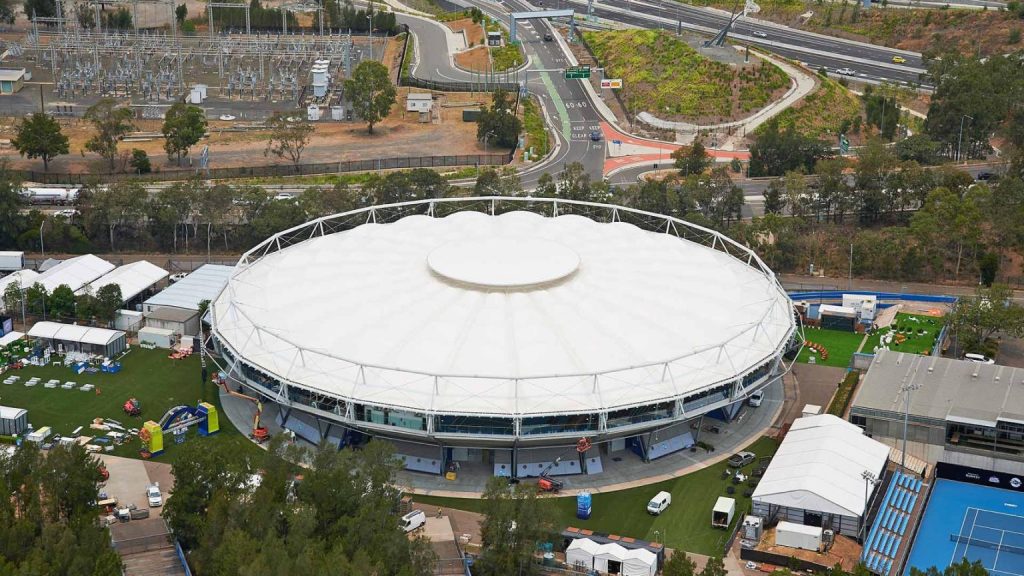
In 2019 a project was underway to add a new canopy roof to the Ken Rosewall Arena in Australia. Macalloy was engaged to provide the steel tension rods. And Premier Galvanizing Hull (part of the Joseph Ash Group) was engaged by Macalloy for hot dip galvanizing.
The Ken Rosewall Arena was originally built at the Sydney Olympic Park Tennis Centre for the 2000 Olympic Games. With seating for 10,500 people it has proved a popular venue for tennis fans ever since.
In 2019 it was redeveloped to become a multi-purpose indoor arena, and it is now also the home of netball in New South Wales.
As part of the redevelopment it changed from being an open arena to a semi-enclosed all-weather venue. A significant structural engineering undertaking!
The project – designed by Cox Architecture, in conjunction with Arup – required steel tension rods for the canopy, with steel cables forming the shape of the roof and providing support. Due to the scale of the project and the size of tension rods required, Macalloy was chosen to provide the rods.
Even though Macalloy are based in the UK, and the project was on the other side of the world, they were the perfect company as they’re the only fabricator in the world who can provide such large tension rods.
Because the rods are made from steel, and steel corrodes and rusts if left untreated, Macalloy engaged Premier Galvanizing Hull to hot dip galvanize the metal.
Premier Galvanizing was not the first galvanizer to start the job though. Macalloy had previously engaged another galvanizer who provided inadequate design advice for hot dip galvanizing, and the job started to fall behind schedule.
For galvanizing to work, it’s important for galvanizers to talk to individual fabricators and impart advice on how to prepare steel for galvanizing. For example, to achieve the best quality zinc coating, it is crucial to ensure that molten zinc can flow freely over all surfaces, external and internal. So, where there are sealed hollow sections or cavities, vent and drain holes are essential.
Macalloy called Premier Galvanizing to see if they could help with their job and get the project back on track, and Andrew Tweddle (Commercial Manager at Premier Galvanizing Hull) drove to Dinnington in South Yorkshire to look at the steel rods and suggest some improvements.
Macalloy were happy for Premier Galvanizing to hot dip galvanize a trial batch. Pleased with the results, they engaged them to complete the whole job.
In total Premier Galvanizing hot dip galvanized 204 tension rods, with the largest weighing in at about 600 kilos each, with some reaching almost 10 metres in length. It was a huge job… almost 50 tonnes of steel.
Premier Galvanizing were also pleased to help Macalloy with some of the project logistics by collecting the steel with their fleet of trucks and delivering it back to Dinnington once they’d completed their part of the job.
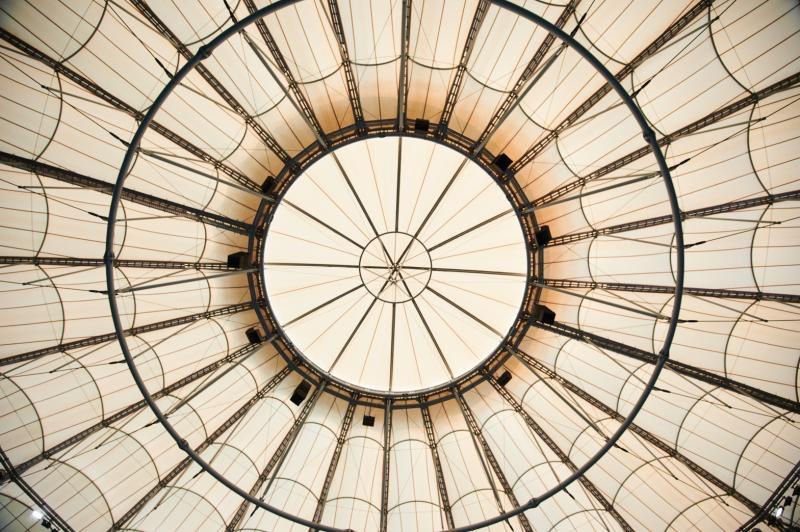
Andrew Tweddle said: “Working with Macalloy has been a pleasure, and hopefully the start of a good working relationship. We spent a good few weeks hot dip galvanizing the steel and we were proud of our efforts and our ability to provide sound technical advice. We were also proud to help Macalloy get the project back on track – in fact our hard work helped them to get eight weeks ahead of schedule.”
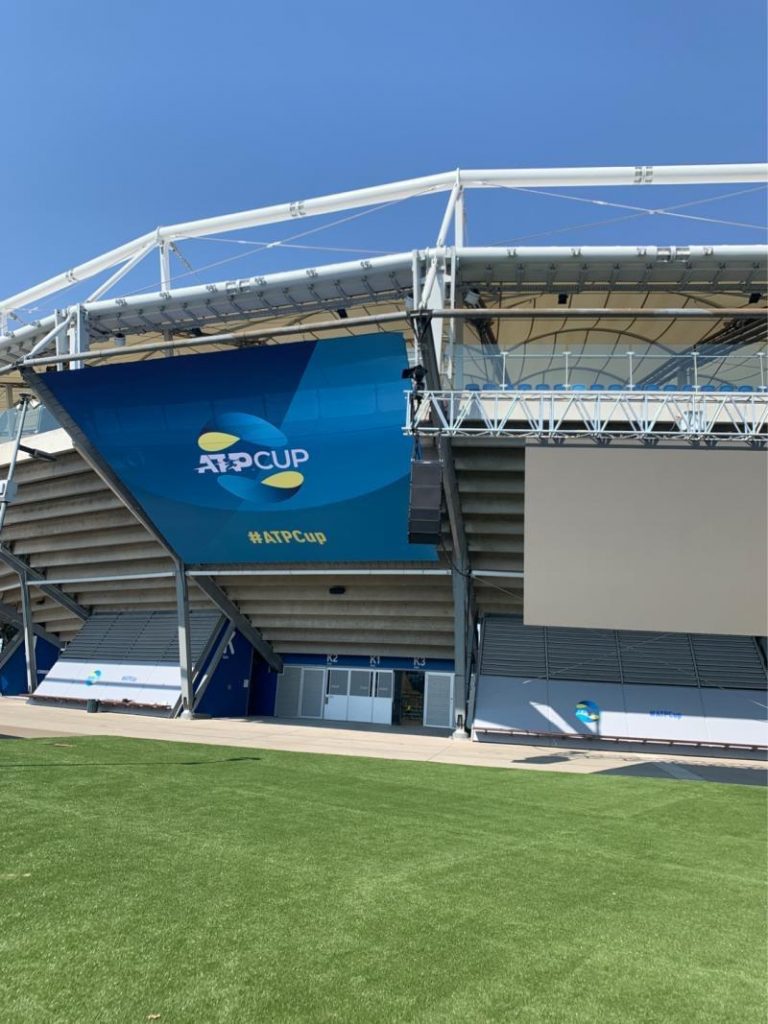
The new roof for the Ken Rosewall Arena was finished by Cox Architecture and Arup in December 2019, just in time for the ATP Cup in January 2020. We hope it continues to be a great home for tennis and netball in the coming years.
You can read more about the project here.
Designed and fabricated by Luke Perry. Hot dip galvanized by Joseph Ash Telford.
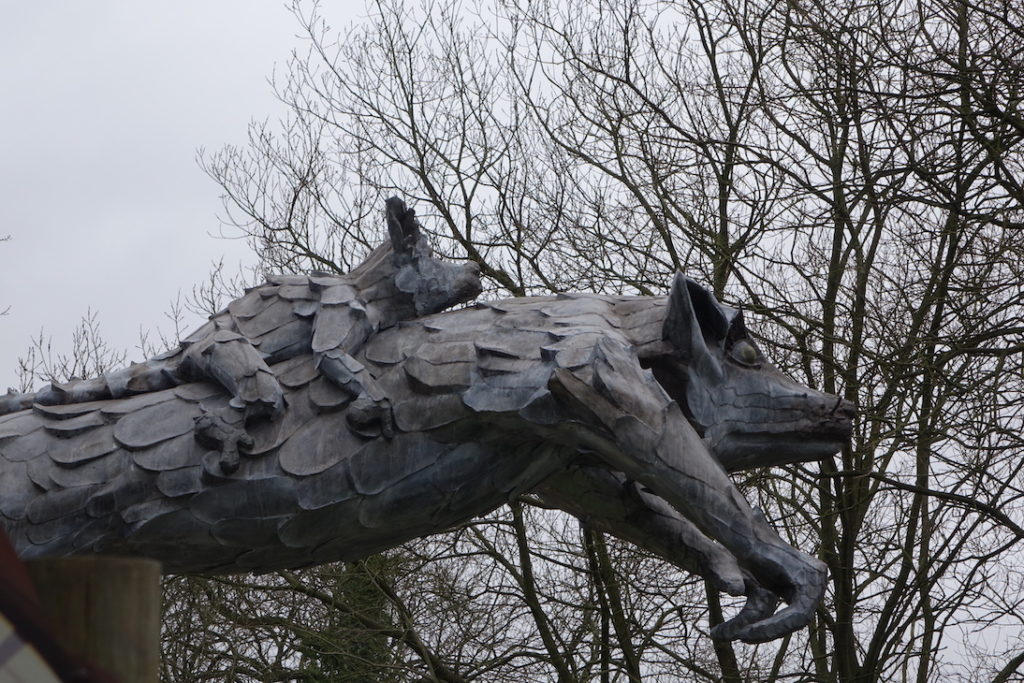
Earlier this year, a gigantic sculpture was added to the Lemur Wood of Dudley Zoo and Castle (DZC), in the Midlands. The stunning sculpture depicts a ring-tailed lemur, with a baby on its back, leaping from one pole to another.
Designed and fabricated by Luke Perry, an English artist renowned for creating huge works of art, the sculpture also includes words on the poles about the threats to the species. Threats which include hunting, logging, deforestation, and the pet trade.

DZC commissioned the sculpture as they wanted to educate visitors not only about the threats to lemurs (90% of the population currently faces extinction), but also about ongoing threats to other species.
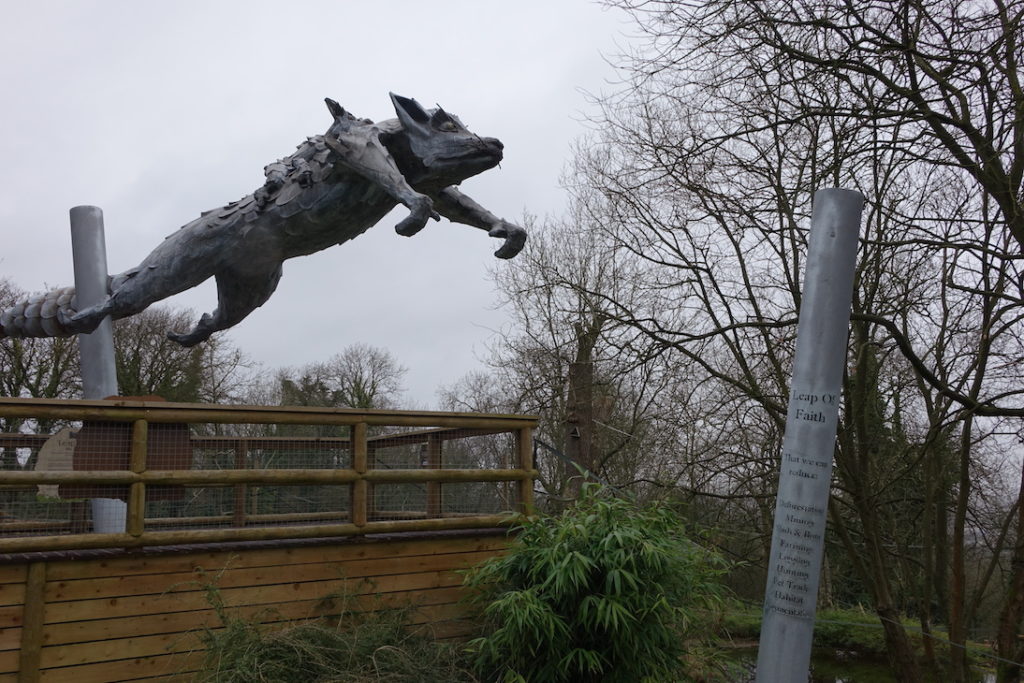
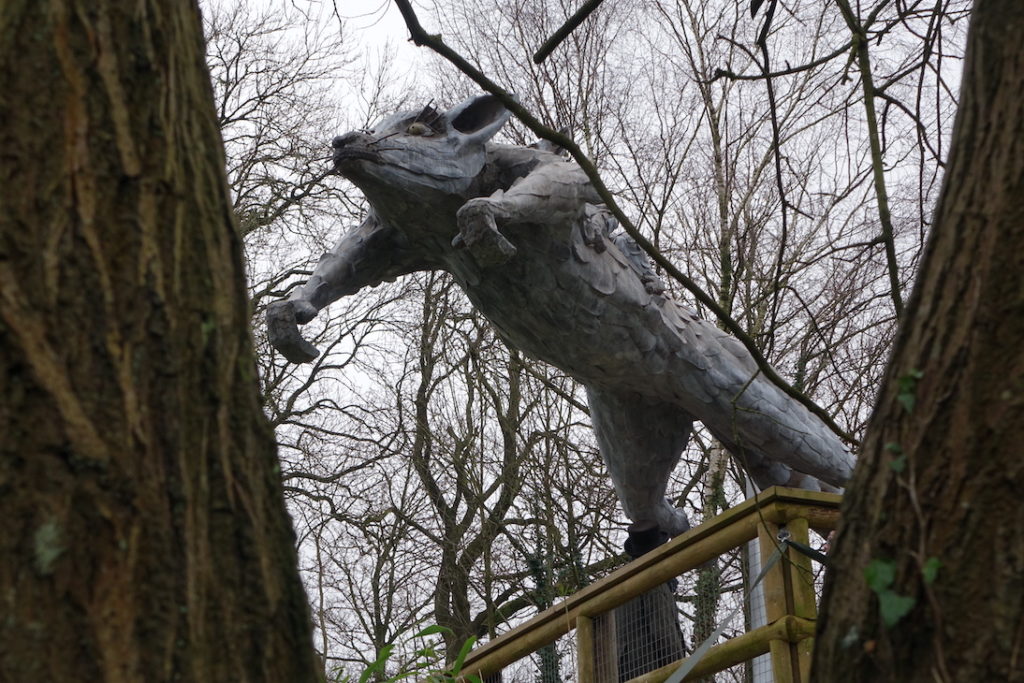
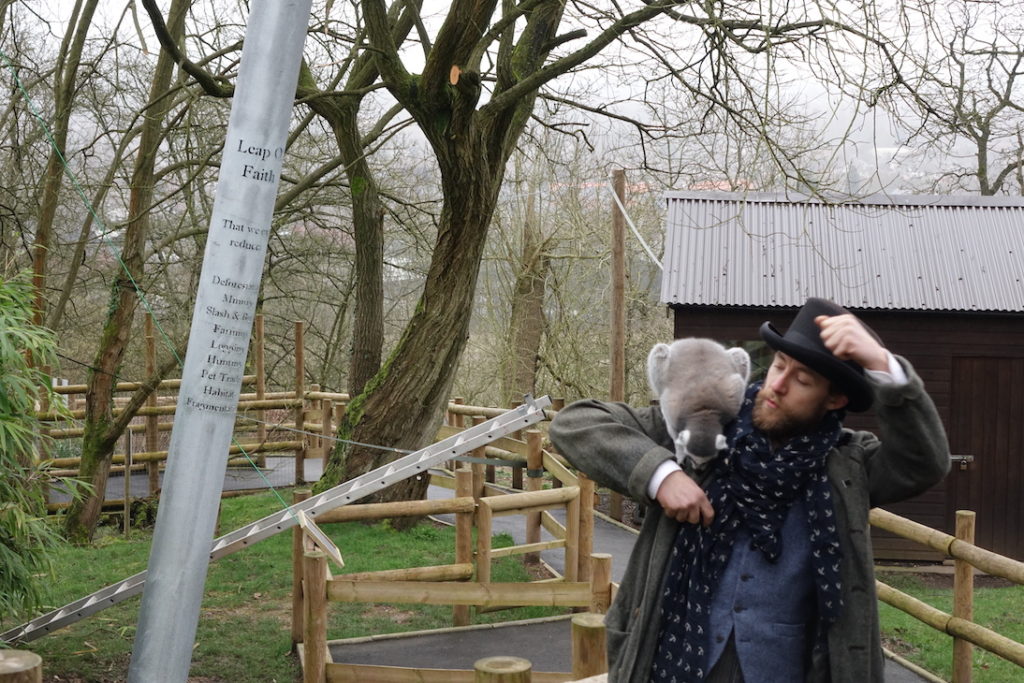
According to the Express & Star website, Derek Groves, the Zoo Director, said: “[The statue is] built around the concept of lemurs being an endangered species, and whether they survive in the wild is whether humans take action and help to stop them being wiped out.
“The lemur is on one post and the question is whether it gets to the other side. It’s down to us.
“[The statue is] not just about lemurs. It’s about all animals and their habitats, so hopefully it will [not only] be a photo opportunity, but also [a chance for] people to look at the statue and get the message.
“Hopefully it will get people to think more about the animals and their habitats and change their behaviours.”
Titled ‘A Leap of Faith’, the sculpture – made from sheet steel – took six months to build and at 30ft is one the largest sculptures Luke has ever fabricated.
Because steel is prone to rust and corrosion if left untreated, Luke engaged Joseph Ash Galvanizing to hot dip galvanize it.
Hot dip galvanizing is important because it provides a long-life, low-maintenance corrosion protection which safeguards steel from atmospheric attack.
Mick Jackson from Joseph Ash Galvanizing said: “It was a pleasure to be asked to treat the steel for this sculpture. Having worked on an installation for Luke a few years back (Queen Aethelflaed, Lady of the Mercians) we know how amazing his work is, and we know how important it is to protect the steel from the environment for many years to come.
I was at DZC on the day of the sculpture unveiling, and it was wonderful to see it in its final place.”
As supporters of the Lemur Conservation Association, Dudley Zoo has always had a strong interest in lemurs. The zoo is also home to five different species of lemur – ring-tailed, black-and-white ruffed, red ruffed, collared and black. Luke had to study the creatures for many hours so that he could accurately depict a lemur in his statue.
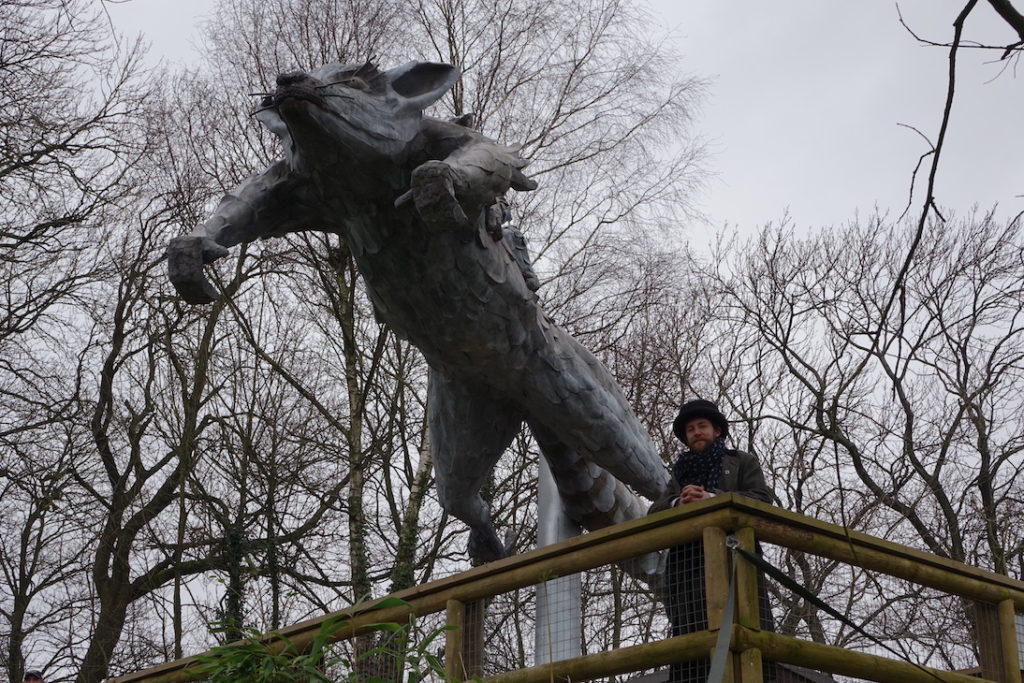
According to the Dudley Zoo and Castle website, Luke said: “Thank you to DZC for giving me the opportunity to do something a bit different. It’s been a challenge and it’s been the first time I’ve had to put wheels on a sculpture and nearly take a wall out just to get it out of the factory!
But I’m so very pleased with it and I’m pleased people like it.”
Dudley Zoo and its visitors are thrilled with the sculpture, as is Luke Perry. We were also thrilled to be a part of a such a huge and beautiful project, and something which will impart an important conservation message.
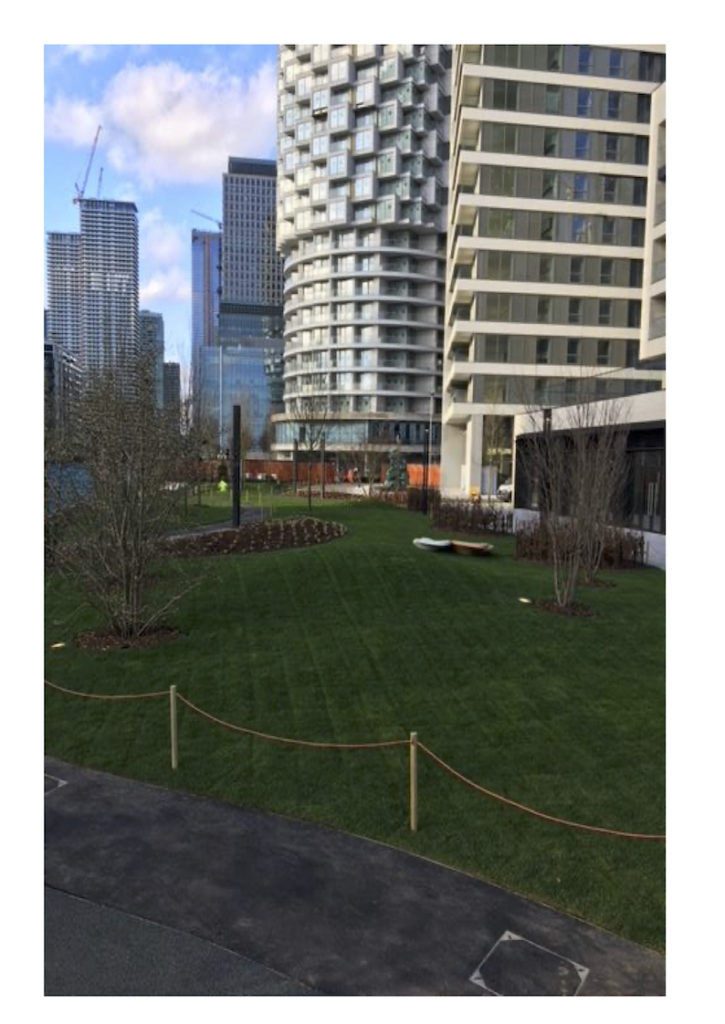
Wood Wharf is a new neighbourhood in Canary Wharf, London. When the exciting development work completes in 2023 it will include offices, residential homes, community space, leisure and entertainment sites, and retail space.
As the neighbourhood will contain 3,300 homes, a new children’s play area has recently been designed and built by Willerby Landscapes, based in Edenbridge, Kent.
As part of the project, Willerby Landscapes engaged Crest Engineering Ltd to fabricate some of the play equipment, and Crest engaged Joseph Ash Medway to protect the steel.
You can see some of the photos here:
There were many elements to the play area, including bridges, a climbing frame, seating and a seesaw.
Joseph Ash Galvanizing collected the steel from Crest Engineering. It was taken to the Joseph Ash Medway plant so that our team could protect it for many years to come with a hot dip galvanized and powder coated finish. The powder coating elements alone amounted to about 200kg of mild steel and the client chose pink and pearl violet RAL 4011 as the colours. The steel was then delivered back to Crest Engineering’s site in Marden, Kent, by our delivery team.
Tim Palmer at Joseph Ash Medway said: “We were very proud to treat the steel for this wonderful project and it will be great to see the playground in use when the first residents of Wood Wharf begin to move in this Summer (COVID allowing of course). It was also great to work on a project for Crest Engineering Ltd, and we look forward to working with them again should another project arise.”
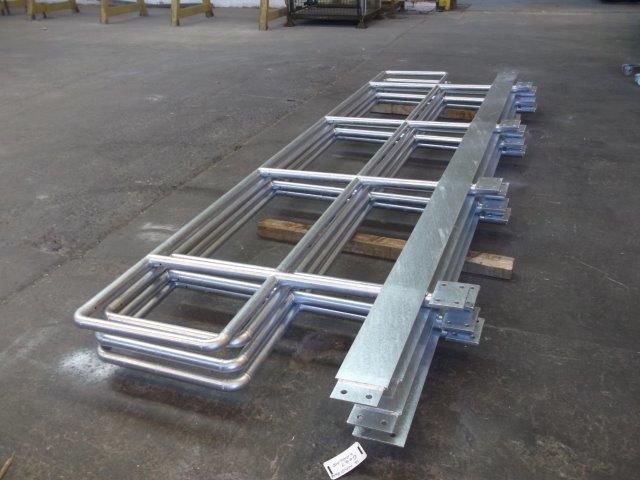
In the run-up to the COVID-19 lockdown, it was a tricky time for all businesses making decisions about whether or not to keep operating and having to drastically change ways of working.
At Joseph Ash we made the decision early to maintain operations at all of our Joseph Ash Galvanizing and Premier Galvanizing plants as we have an important role to play in the supply chain of essential service companies – from infrastructure to food manufacturing, security and healthcare.
Some of the things we have been most proud to galvanize in the last month include steel products for the NHS. We’ve been galvanizing clinical waste bins and trucks, crash trolleys, steelwork for the temporary Nightingale Hospitals, and sadly a temporary morgue.
The above pictures show some of the steel railings we galvanized for the Dragon Heart’s Hospital in Cardiff on behalf of fabricators W Hare Ltd, as well as steel for an emergency extension to an oxygen tank facility at St. Thomas’s Hospital in London on behalf of SWF Ltd. (More photos can be seen in our Photo Gallery.)
Whilst the safety of our team members and customers is always our top priority (see our news story), we’re glad to be continuing with operations, enabling us to support essential services, and hopefully do our bit to keep the economy going.
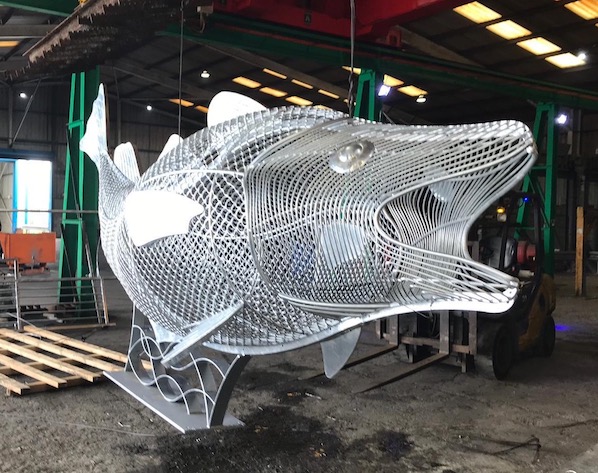
Meet Fin the Fish, a magnificent sculpture commissioned by Yorkshire Water and the University of Hull to showcase the growing problem of plastic pollution in our seas.
Built by Godbold Blacksmiths Ltd and hot dip galvanized by Premier Galvanizing Hull (part of the Joseph Ash Group), Fin the Fish acts as a receptacle for used plastic and is part of the ‘Do your bit’ campaign which encourages people to recycle plastic, reduce plastic use, and consequently make small efforts to look after the environment.
Originally installed at Scarborough’s South Bay last Summer to entice beach goers to clean up the beach, Fin is now spending his winter months at The Deep in Hull.
Fin’s Summer months proved successful. In just eight weeks, the public fed him over 6000 plastic bottles, which Scarborough Council recycled. The sheer number of bottles highlighted just how much plastic is used on a daily basis and encouraged people to think about how widespread plastic pollution is, and how much damage it causes to our marine ecosystem.
Yorkshire Water and the University of Hull are hoping Fin will have the same effect on the residents of Hull. To measure the success, local firm Biffa will record how much plastic is fed to Fin on a weekly basis, emphasising just how much plastic could have instead (possibly) entered the water courses.
As reported in an article by Yorkshirewater.com: “The University of Hull Energy and Environment Institute is researching solutions to some of the biggest environmental challenges facing the world today, from climate change and plastics to flooding and renewable energy.
Professor Dan Parsons, Director of the Institute, said: “The world has woken up to the critical issue of plastic pollution in our oceans, which is a growing challenge and is having devastating consequences for marine environments both globally and off our Yorkshire coastline.”
Fin the Fish was fabricated from steel, is 5m long and weighs 700kg.
To protect the sculpture from the elements and prevent it from rusting – especially in harsh coastal environments – it was sent to Premier Galvanizing Hull for a protective hot dip galvanized finish.
Andrew Tweddle, Commercial Manager at Premier Galvanizing said: “The environment and sustainability is important to Premier Galvanizing and we try to introduce more innovative and environmentally friendly processes at our plants on a daily basis. Because of this, it was an honour to be asked to protect the steel for Fin the Fish.”
Alex Camp, Divisional Manager at Premier Galvanizing Hull said: “We visited Fin when he was first installed at Scarborough in the Summer. It’s quite nice to see him back in Hull though for the Winter months. He has already proved popular with the locals and we’re keen to see what the final plastic count will be when he moves location in April. We hope Fin the Fish makes a difference – no matter how small – in changing the way people think about protecting the environment.”
